- Home
- J. D. Robb
Big Jack Page 10
Big Jack Read online
Page 10
“Did you have them charged? Chicago?”
He flipped a towel, began to dry off. “I handled it. My way, Lieutenant,” he said before she could speak. “I don’t call the cops at every bump in the road.”
“I keep hearing that lately. Embezzlement’s a crime, Roarke.”
“Is it now? Well, fancy that.” With the towel hooked over his hips, he brushed by her and went to his closet. “They’ll pay, you can be sure of that. I imagine they’re even now drinking themselves into a sweaty stupor and weeping bitter tears over their respective career suicides. Be lucky to cop a job sweeping up around a desk now much less sitting behind one. Buggering sods.”
She thought it over. “The cops would’ve been easier on them.”
He glanced back, his grin fierce and cold. “Undoubtedly.”
“I’ve said it before, I’ll say it again. You’re a very scary guy.”
“So . . . ” He pulled on a shirt, buttoned it. “And how was your day, darling Eve?”
“Fill you in on the way.”
She told him so that by the time they arrived at the restaurant he was thoroughly briefed.
Peabody, Eve noted, had given an accurate description. The place was packed and noisy and the air smelled amazing. Waitstaff, with white bib aprons over their street clothes, moved at a turtle pace as they carried trays loaded with food to tables or hauled away empty plates.
When waitstaff didn’t have to bust ass for tips, Eve had to figure it all came down to the food or the snob factor. From the looks of the process here, and the simplicity of decor, the food must be superior.
Someone crooned over the speakers in what she assumed was Italian, just as she assumed the almost childlike murals that decorated the walls were of Italian locales.
And she noted the stubby candles on each table. Just like the one Tina Cobb had kept among her mementos.
“I booked in your name.” She had to raise her voice, aim it toward Roarke’s ear to be heard over the din.
“Oh?”
“They were booked solid. Roarke clears a table quicker than Dallas.”
“Ah.”
“Oh. Ah. Blah blah.”
He laughed, pinched her, then turned to the apparently disinterested maître d’. “You’ve a table for two, under Roarke.”
The man was squat, with his ample bulk squeezed into an old-fashioned tuxedo like a soy sausage pumped into a casing. His bored eyes popped wide, and he lurched from his stool station to his feet. When he bowed, Eve expected him to pop out of the tuxedo.
“Yes, yes! Mr. Roarke. Your table is waiting. Best table in the house.” His Italian accent had a definite New York edge. Rome via the Bronx. “Please, come with me. Shoo, shoo.” He waved at and jostled waiters and customers alike to clear a path. “I am Gino. Please to tell me if you wish for anything. Anything. Tonight’s pasta is spaghetti con polpettone, and the special is rollatini di pollo. You will have wine, yes? A complimentary bottle of our Barolo. It’s very fine. Handsome and bold, but not overpowering.”
“Sounds perfect. Thank you very much.”
“It’s nothing. Nothing at all.” He snapped his fingers toward a waiter who’d obviously been put on alert. In short order, the wine was displayed, opened, poured and approved. Menus were offered with a flourish, and the staff retreated to hover and largely ignore diners who hoped to be served sometime in the next decade.
“Do you ever get tired of being fawned over?” Eve asked him.
“Let me think.” Roarke sipped his wine, leaned back. Smiled. “No.”
“Figured.” She glanced at the menu. “What’s that spaghetti polepot stuff he was talking about?”
“Polpettone. Spaghetti and meatballs.”
“Really?” She perked up. “Okay, that sets me up.” She laid the menu aside. “What are you having?”
“I think I’ll try the two-sauce lasagna. You put it in my head, and I can’t get it out. We’ll have some antipasto to start, or we’ll disappoint our hosts.”
“Let’s keep them happy.”
The instant Roarke set down his menu, both the maître d’ and the waiter materialized at the table. She let Roarke order, and drew the ID photo of Tina Cobb out of her bag. “Do you recognize this woman?” she asked Gino.
“I’m sorry?”
“She was in here on a date in July. Do you remember seeing her?”
“I’m sorry,” he repeated. He looked apologetic, then apoplectic as he glanced at Roarke. “We have so many customers.” His brow pearled with sweat; he wrung his hands and stood like a nervous student failing a vital test.
“Just take a look. Maybe you’ll remember her coming in. Young, probably spruced up for a date. About five feet three inches, a hundred and twenty pounds. First-date glow on her.”
“Ah . . . ”
“You could do me a favor,” Eve said before the guy dripped into a nerve puddle at her feet. “You could show that to the waitstaff, see if she rings any bells.”
“I’d be happy to. Honored to, of course. Right away.”
“I like it better when they’re annoyed or pissed off,” Eve decided as he scurried away. “Well, either way, it’s a long shot.”
“We’ll get a good meal out of it. And . . . ” He lifted her hand, kissed her knuckles. “I get a date with my wife.”
“Place does a hell of a business. How come you don’t own it?”
He kept her hand as he sipped his wine. There was no sign of a man who’d bounced from city to city all day, firing embezzlers and incompetents. “Would you like to?”
She only shook her head. “Two dead women. One a means to an end, the other just in the right place at the wrong time. He’s not a killer by design. He kills because it’s expedient. Wants to reach the goal. To reach it, you have to utilize tools, dispose of obstacles. Sort of like what you did today, only with real blood.”
“Hmm” was Roarke’s comment.
“What I mean is you’re going to get from point A to point B, and if you have to take a side trip and mow over somebody, you do. I mean, he’s directed.”
“Understood.”
“If Jacobs hadn’t been there, he wouldn’t have had to kill her. If he hadn’t had to kill Jacobs, he probably wouldn’t have killed Cobb. At least not right away, though I’d lay odds he’d worked out how he’d do it when and if. If he’d found the diamonds—fat chance—or more likely found something that led him to them, he’d have followed the trail.”
She grabbed a bread stick, broke it in half, then crunched down. “He doesn’t quibble at murder, and must have—because he thinks ahead—he must have considered the possibility of disposing of Samantha Gannon once he had his prize in hand. But he didn’t go into her house with murder on the agenda.”
“He adjusts. Understands the value of being flexible and of keeping his eye on the ball, so to speak. What you have so far doesn’t indicate a man who panics when something alters his game plan. He works with it, and moves on accordingly.”
“That’s a pretty flattering description.”
“Not at all,” Roarke disagreed. “As his flexibility and focus are completely amoral and self-serving. As you pointed out, I’ve had—and have—game plans of my own, and I know, very well, the seductive pull of glittering stones. Cash, however sexy it might be, doesn’t hook into you the same way. The light of them, the dazzle and the colors and shapes. There’s something primitive about the attraction, something visceral. Despite that, to kill over a handful of sparkles demeans the whole business. To my mind, in any case.”
“Stealing them’s okay though.”
He grinned now, and took the second half of her bread stick. “If you do it right. Once—in another life, of course—I . . . relieved a London bird of a number of her sparkling feathers. She kept them locked away in a vault—in the dark—such a pity. What’s the point in locking all those beauties away, after all, where they only wait to shine again? She kept a house in Mayfair, guarded like Buckingham bloody Palace. I did the
job solo, just to see if I could.”
She knew she shouldn’t be amused, but she couldn’t help it. “Bet you could.”
“You win. Christ, what a rush. I think I was twenty, and still I remember—remember exactly—what it was to take those stones out of the dark and watch them come alive in my hands. They need the light to come alive.”
“What did you do with them?”
“Well now, that’s another story, Lieutenant.” He topped off their wineglasses. “Another story entirely.”
The waiter served their antipasto. On his heels the maître d’ came hurrying back, pulling a waitress by the arm.
“Tell the signora,” he ordered.
“Okay. I think that maybe I waited on her.”
“She thinks maybe,” Gino echoed. He almost sang it.
“She with a guy?”
“Yeah. Listen, I’m not a hundred percent.”
“Is it okay if she sits down a minute?” Eve asked Gino.
“Whatever you like. Anything you like. The antipasto, it’s good?”
“It’s great.”
“And the wine?”
Noting the flicker in Eve’s eyes, Roarke shifted. “It’s very nice wine. A wonderful choice. I wonder, could we have a chair for . . . ”
“I’m Carmen,” the waitress told him.
Fortunately there was a chair available as Eve had no doubt Gino would have personally dumped another diner out of one to accommodate Roarke’s request.
Though he continued to hover, Eve ignored him and turned to Carmen. “What do you remember?”
“Well.” Carmen looked hard at the photo she’d given back to Eve. “Gino said it was a first-date thing. And I think I remember waiting on her—them. She was all nervous and giddy like she didn’t get out much, and she looked young enough that I had to card her. I sort of hated to do it because she got all flustered, but it was okay because she was legal. Barely. That’s why I sort of remember.”
“What about him. What do you remember about him?”
“Um . . . He wasn’t as young as her, and he was a lot smoother. Like he’d been around some. He ordered in Italian, casual like. I remember that because some guys do and it’s a real show-off deal, and others pull it off. He pulled it off. And he didn’t stint on the tip.”
“How’d he pay?”
“Cash. I always remember when they pay cash, especially when they don’t stiff me.”
“Can you describe him?”
“Oh, I don’t know. I didn’t pay that close. I think he had dark hair. Not too dark. I mean not . . . ” She shifted her gaze to Roarke and her eyes skimmed over his hair and would have sighed if they could. “Not black.”
“Uh-huh. Carmen.” Eve tapped her on the hand to regain her attention. “What about skin color?”
“Oh, well, he was white. But he had a tan. I remember that now. Like he’d had a really good flash or a nice vacation. No, he had light hair! That’s right. He had blondish hair because it was a real contrast with the tan. I think. Anyway. He was really attentive to her, too. Now that I’m thinking, I remember most times I went by he was listening to her, or asking her questions. A lot of guys—hell, most guys—don’t listen.”
“You said he was older than she was. How much older?”
“Jeez, it’s hard to say. To remember. I don’t think it was one of those daddy-type things.”
“How about build?”
“I don’t really know. He was sitting, you know. He wasn’t a porker. He just looked normal.”
“Piercings, tattoos?”
“Oh wow. Not that I remember. He had a really good wrist unit. I noticed it. She was in the ladies’ when I brought out their coffee, and he checked the time. It was really sharp-looking, thin and silvery with a pearly face. What do they call that?”
“Mother-of-pearl?” Roarke suggested.
“Yeah. Yeah, mother-of-pearl. It was one sharp-looking piece. Expensive-looking.”
“Would you be willing to work with a police artist?”
“This is a cop thing? Wow. What did they do?”
“It’s him I’m interested in. I’d like to arrange for you to come down to Central tomorrow. I can have you transported.”
“I guess. Sure. It’d be kind of a kick.”
“If you’d give me your information, someone will contact you.”
Eve plucked an olive from the plate as Carmen carried her chair away. “I love when long shots pay off.” She saw the plates of pasta heading in their direction and struggled not to salivate. “Just give me one minute to set this up.”
She pulled out her ’link to call Central and arrange for an artist session. While she listened to the desk sergeant, asked a couple of pithy questions, she twirled pasta on her fork.
She ended the call, stuffed the pasta in her mouth. “Nadine broadcast the connection.”
“What?”
“Sorry.” She swallowed and repeated the statement more coherently. “Figured she’d make it after talking to Gannon, and that she’d go on air.”
“Problem?”
“If it was dicey I’d’ve stopped her. And to give her credit, she’d have let me. No, it’s no problem. He’ll catch a broadcast and he’ll know we’ve got lines to tug. Make him think, make him wonder.”
She stabbed a meatball, broke off a forkful, wrapped pasta around it. “Bobby Smith, whoever the hell he is, should be doing a lot of thinking tonight.”
And he was. He’d come home early from a cocktail party that had bored him to death. The same people, the same conversations, the same ennui. There was never anything new.
Of course, he had a great deal new to talk about. But he hardly thought his recent activities were cocktail conversation.
He’d switched on the screen. Before he’d gone out he’d programmed his entertainment unit to record any mention of various key words: Gannon, Jacobs—as that had turned out to be her name—Cobb. Sweet little Tina. And sure enough, there’d been an extended report by the delicious Nadine Furst on 75 that had combined all of those key words.
So, they’d made the connection. He hadn’t expected the police to make it quite that quickly. Not that it mattered.
He changed into lounging pants, a silk robe. He poured himself a brandy and fixed a small plate of fruit and cheese, so that he could be comfortable while he viewed the report again.
Settled on the sofa in the media room of his two-level apartment on Park Avenue, he nibbled on Brie and tart green grapes while Nadine relayed the story again.
Nothing to link him to the naive little maid, he concluded. He’d been careful. There’d been a few transmissions, true, but all to the account he’d created for that purpose, and sent or received from a public unit. He’d always taken her places where they were absorbed by a crowd. And when he’d decided he needed to kill her, he’d taken her to the building on Avenue B.
His father’s company was renovating that property. It was untenanted, and though there had been some blood—actually, considerable blood—he’d tidied up. Even if he’d missed a spot or two, crews of carpenters and plumbers would hardly notice a new stain or two among the old.
No, there was nothing to connect a silly maid from the projects to the well-educated, socially advanced and cultured son of one of the city’s top businessmen.
Nothing to connect him to the earnest and struggling young artist Bobby Smith.
The artist angle had been brilliant—naturally. He could draw competently enough, and he’d charmed the naive and foolish Tina with a little sketch of her face.
Of course, he’d had to ride a bus to create the “chance” meeting. Hideous ordeal. He had no idea how people tolerated such experiences, but imagined those who did neither knew nor deserved any better.
After that, it was all so simple. She’d fallen in love with him. He’d hardly had to expend any effort there. A few cheap dates, a few kisses and soulful looks, and he’d had his entrée into Gannon’s house.
He’d had only to moon
around her, to go with her one morning—claiming as he met her at the bus stop near the town house that he hadn’t been able to sleep thinking of her.
Oh, how she’d blushed and fluttered and strolled with him right to Gannon’s front door.
He’d watched her code in—memorized the sequence, then, ignoring her halfhearted and whispered protests, had nipped in behind her, stealing another kiss.
Oh Bobby, you can’t. If Miz Gannon comes down, I could get in trouble. I could get fi red. You have to go.
But she’d giggled, as if they were children pulling a prank, as she shooed at him.
So simple then to watch her quickly code into the alarm. So simple.
Not as simple, he admitted now, not nearly as simple for him to walk out again and leave her waving after him. For a moment, just one hot moment, he’d considered killing her then. Just bashing in that smiling, ordinary face and being done with it. Imagined going upstairs, rooting Gannon out and beating the location of the diamonds out of her.
Beating her until she told him everything, everything she hadn’t put in her ridiculous book.
But that hadn’t been the plan. The very careful plan.
Then again, he thought with a shrug, plans changed. And so he’d gotten away with murder. Twice.
After toasting himself, he sipped brandy.
The police could speculate all they liked, they’d never connect him, a man like him, with someone as common as Tina Cobb. And Bobby Smith? A figment, a ghost, a puff of smoke.
He wasn’t any closer to the diamonds, but he would be. Oh, he would be. And at least he wasn’t, by God, bored.
Samantha Gannon was the key. He’d read her book countless times after the first shocked reading, when he’d found so many of his own family secrets spread out on the page. It amazed him, astounded him, infuriated him.
Why hadn’t he been told there were millions of dollars—millions—tucked away somewhere? Diamonds that belonged, by right, to him.
Dear old Dad had left that little detail out of the telling.
He wanted them. He would have them. It really was that simple.
With them he could, he would, break away from his father and his tedious work ethic. Away from the boredom, the sameness of his circle of friends.

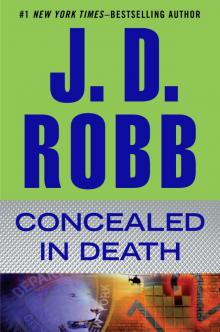 Concealed in Death
Concealed in Death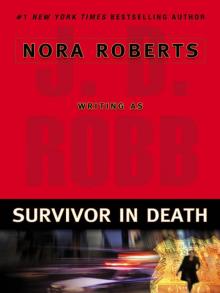 Survivor in Death
Survivor in Death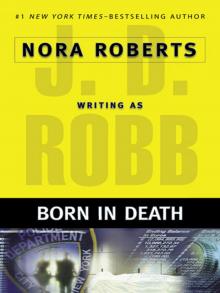 Born in Death
Born in Death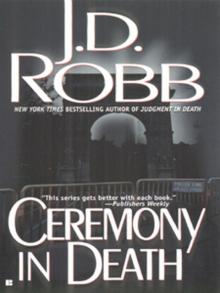 Ceremony in Death
Ceremony in Death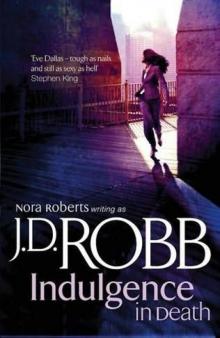 Indulgence in Death
Indulgence in Death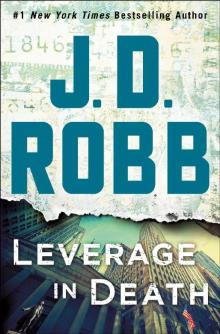 Leverage in Death
Leverage in Death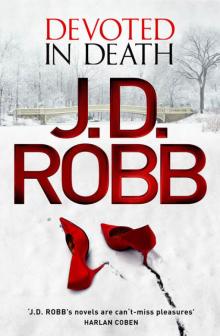 Devoted in Death
Devoted in Death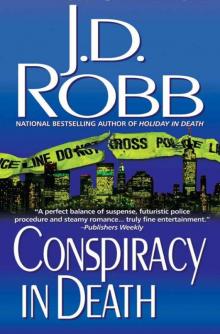 Conspiracy in Death
Conspiracy in Death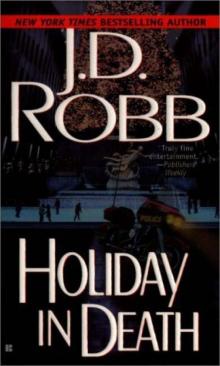 Holiday in Death
Holiday in Death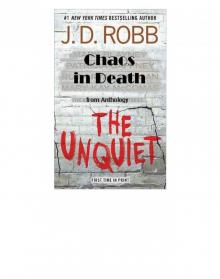 The Unquiet
The Unquiet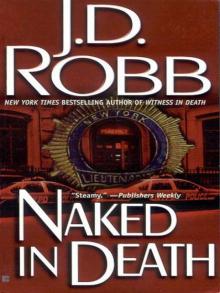 Naked in Death
Naked in Death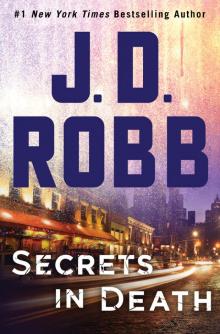 Secrets in Death
Secrets in Death Seduction in Death
Seduction in Death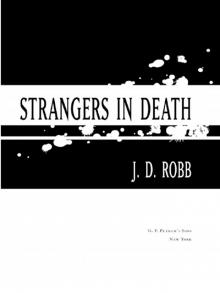 Strangers in Death
Strangers in Death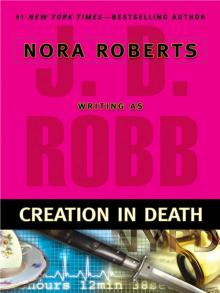 Creation in Death
Creation in Death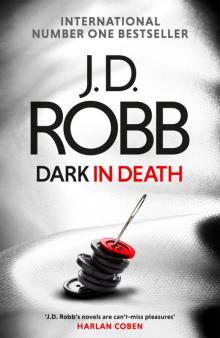 Dark in Death
Dark in Death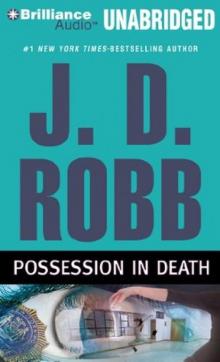 Possession in Death
Possession in Death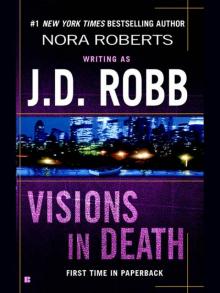 Visions in Death
Visions in Death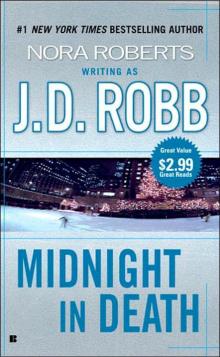 Midnight in Death
Midnight in Death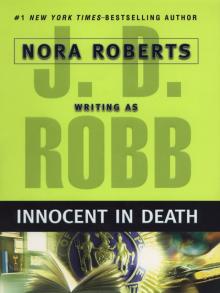 Innocent in Death
Innocent in Death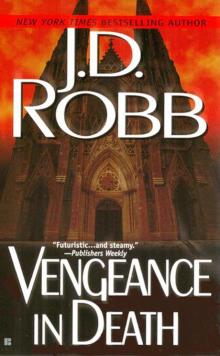 Vengeance in Death
Vengeance in Death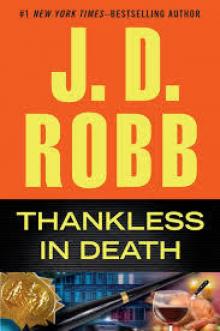 Thankless in Death
Thankless in Death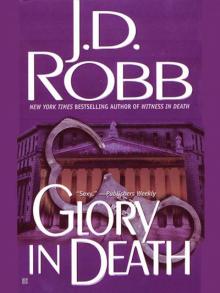 Glory in Death
Glory in Death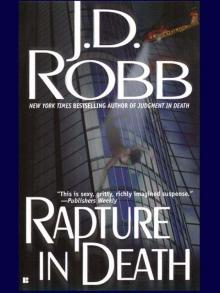 Rapture in Death
Rapture in Death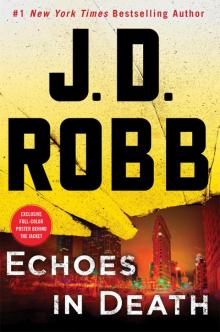 Echoes in Death
Echoes in Death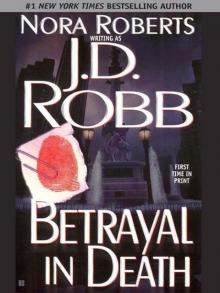 Betrayal in Death
Betrayal in Death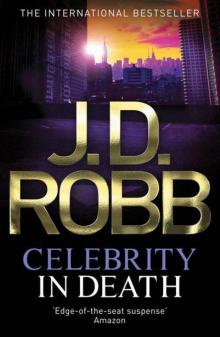 Celebrity in Death
Celebrity in Death Immortal in Death
Immortal in Death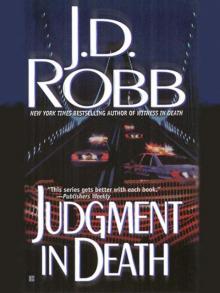 Judgment in Death
Judgment in Death Ritual in Death
Ritual in Death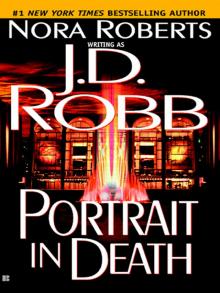 Portrait in Death
Portrait in Death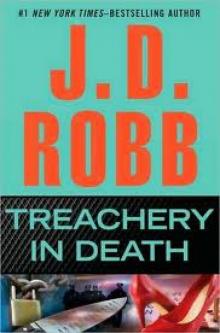 Treachery in Death
Treachery in Death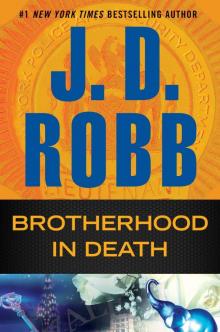 Brotherhood in Death
Brotherhood in Death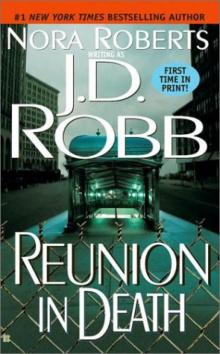 Reunion in Death
Reunion in Death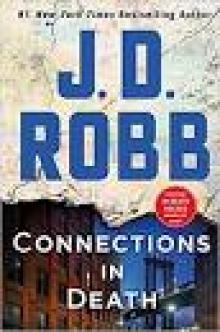 Connections in Death: An Eve Dallas Novel
Connections in Death: An Eve Dallas Novel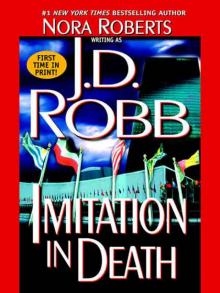 Imitation in Death
Imitation in Death New York to Dallas
New York to Dallas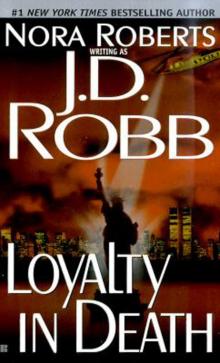 Loyalty in Death
Loyalty in Death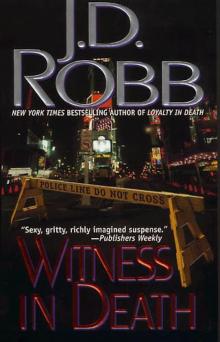 Witness in Death
Witness in Death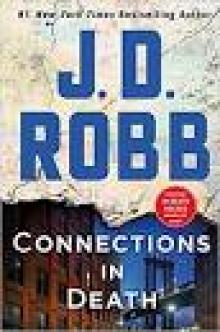 Connections in Death
Connections in Death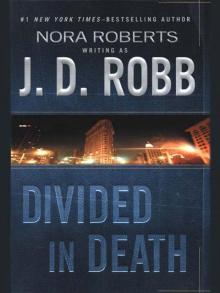 Divided in Death
Divided in Death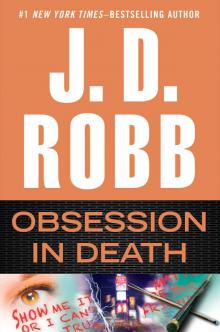 Obsession in Death
Obsession in Death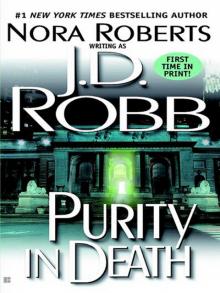 Purity in Death
Purity in Death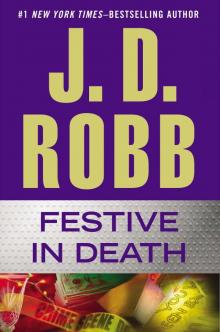 Festive in Death
Festive in Death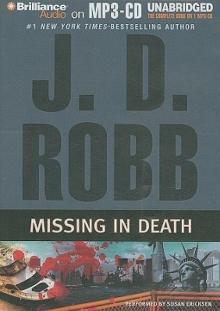 Missing in Death
Missing in Death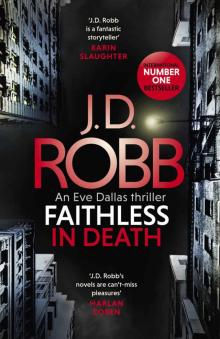 Faithless in Death: An Eve Dallas Thriller (Book 52)
Faithless in Death: An Eve Dallas Thriller (Book 52)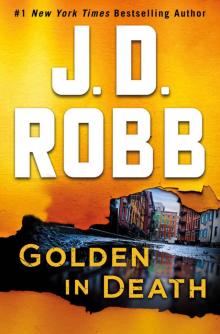 Golden in Death
Golden in Death The In Death Christmas Collection
The In Death Christmas Collection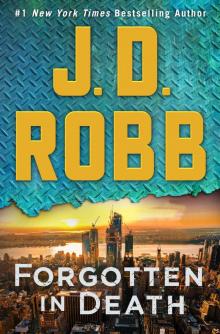 Forgotten in Death
Forgotten in Death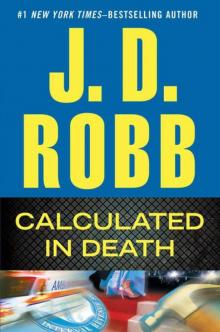 Calculated in Death
Calculated in Death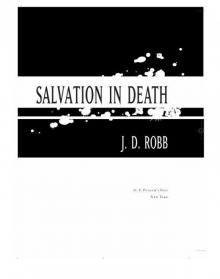 Salvation in Death
Salvation in Death Interlude in Death
Interlude in Death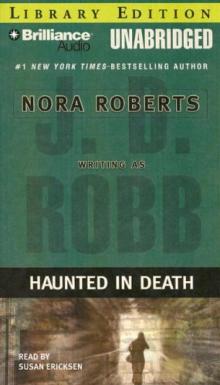 Haunted in Death
Haunted in Death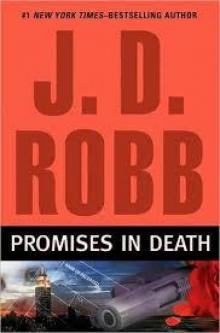 Promises in Death
Promises in Death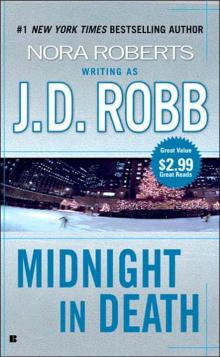 In Death 07.5 - Midnight in Death
In Death 07.5 - Midnight in Death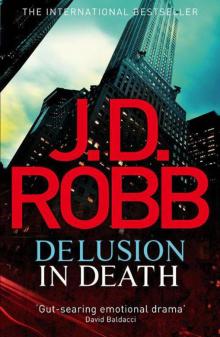 44 Delusion in Death
44 Delusion in Death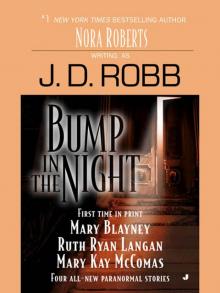 Bump in the Night
Bump in the Night The In Death Collection, Books 16-20
The In Death Collection, Books 16-20![[In Death 17] - Imitation in Death Read online](http://i1.bookreadfree.com/i/03/20/in_death_17_-_imitation_in_death_preview.jpg) [In Death 17] - Imitation in Death
[In Death 17] - Imitation in Death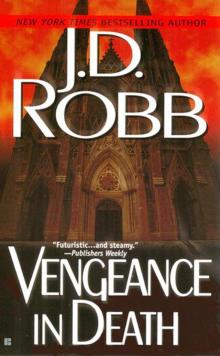 In Death 06 - Vengeance in Death
In Death 06 - Vengeance in Death Dead Of Night
Dead Of Night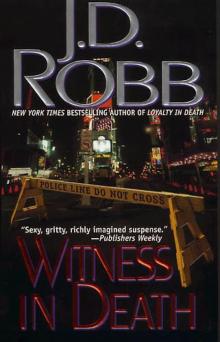 In Death 10 - Witness in Death
In Death 10 - Witness in Death![[In Death 16] - Portrait in Death Read online](http://i1.bookreadfree.com/i1/03/27/in_death_16_-_portrait_in_death_preview.jpg) [In Death 16] - Portrait in Death
[In Death 16] - Portrait in Death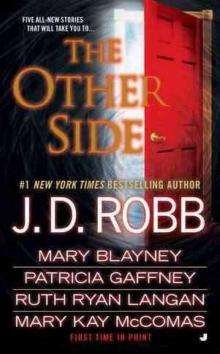 Possession in Death edahr-39
Possession in Death edahr-39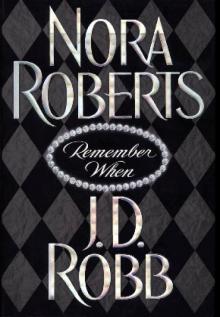 Remember When edahr-20
Remember When edahr-20 Big Jack
Big Jack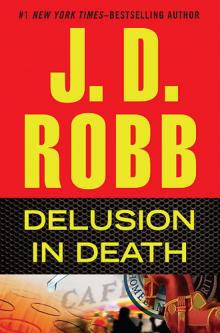 Delusion in Death edahr-44
Delusion in Death edahr-44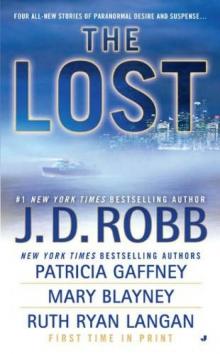 Missing in Death edahr-36
Missing in Death edahr-36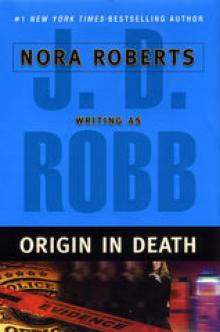 Origin in Death edahr-24
Origin in Death edahr-24![[In Death 18] - Divided in Death Read online](http://i1.bookreadfree.com/i1/04/03/in_death_18_-_divided_in_death_preview.jpg) [In Death 18] - Divided in Death
[In Death 18] - Divided in Death The Lost
The Lost![[In Death 05] - Ceremony in Death Read online](http://i1.bookreadfree.com/i1/04/01/in_death_05_-_ceremony_in_death_preview.jpg) [In Death 05] - Ceremony in Death
[In Death 05] - Ceremony in Death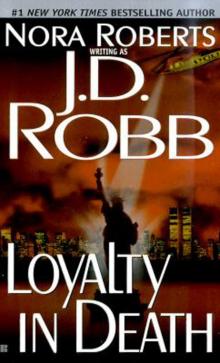 In Death 09 - Loyalty in Death
In Death 09 - Loyalty in Death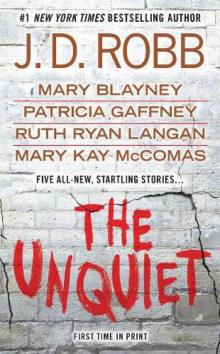 Chaos in Death edahr-42
Chaos in Death edahr-42 In Death 12.5 - Interlude in Death
In Death 12.5 - Interlude in Death![In Death [47] Leverage in Death Read online](http://i1.bookreadfree.com/i1/04/01/in_death_47_leverage_in_death_preview.jpg) In Death [47] Leverage in Death
In Death [47] Leverage in Death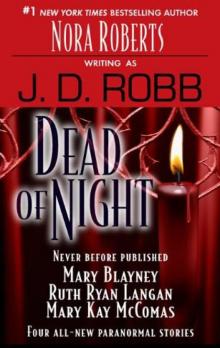 In Death - 24.50 - Dead of Night
In Death - 24.50 - Dead of Night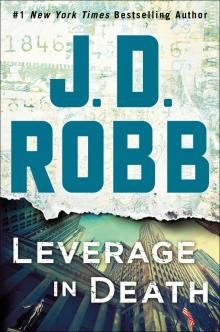 Leverage in Death--An Eve Dallas Novel
Leverage in Death--An Eve Dallas Novel![[In Death 24] - Innocent in Death Read online](http://i1.bookreadfree.com/i1/04/05/in_death_24_-_innocent_in_death_preview.jpg) [In Death 24] - Innocent in Death
[In Death 24] - Innocent in Death![[In Death 15] - Purity in Death Read online](http://i1.bookreadfree.com/i1/04/05/in_death_15_-_purity_in_death_preview.jpg) [In Death 15] - Purity in Death
[In Death 15] - Purity in Death The In Death Collection, Books 26-29
The In Death Collection, Books 26-29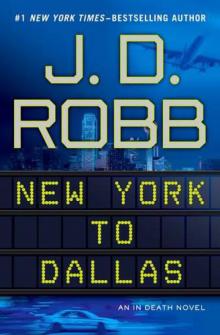 New York to Dallas edahr-41
New York to Dallas edahr-41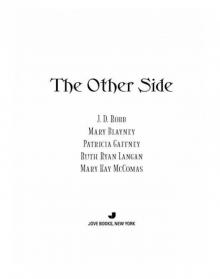 The Other Side
The Other Side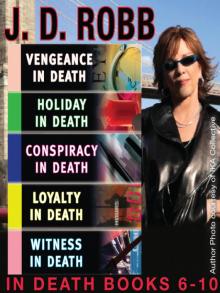 The In Death Collection 06-10
The In Death Collection 06-10![[In Death 08] - Conspiracy in Death Read online](http://i1.bookreadfree.com/i2/04/05/in_death_08_-_conspiracy_in_death_preview.jpg) [In Death 08] - Conspiracy in Death
[In Death 08] - Conspiracy in Death The In Death Collection, Books 21-25
The In Death Collection, Books 21-25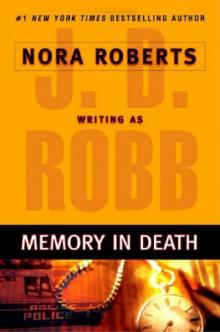 Memory in Death edahr-25
Memory in Death edahr-25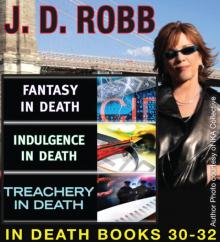 The In Death Collection, Books 30-32
The In Death Collection, Books 30-32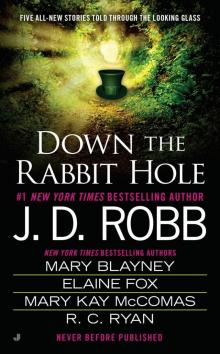 Down the Rabbit Hole
Down the Rabbit Hole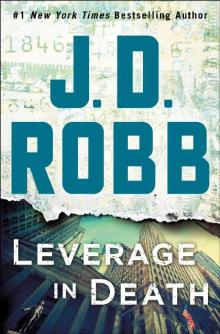 Leverage in Death: An Eve Dallas Novel (In Death, Book 47)
Leverage in Death: An Eve Dallas Novel (In Death, Book 47)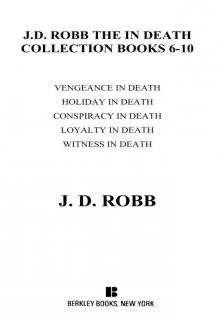 The In Death Collection, Books 6-10
The In Death Collection, Books 6-10 The In Death Collection, Books 11-15
The In Death Collection, Books 11-15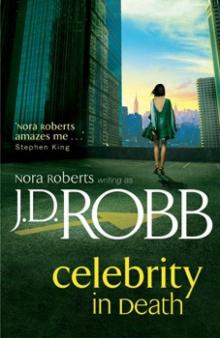 Celebrity in Death edahr-43
Celebrity in Death edahr-43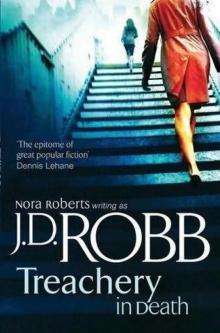 Treachery in Death edahr-40
Treachery in Death edahr-40![[In Death 12] - Betrayal in Death Read online](http://i1.bookreadfree.com/i2/04/13/in_death_12_-_betrayal_in_death_preview.jpg) [In Death 12] - Betrayal in Death
[In Death 12] - Betrayal in Death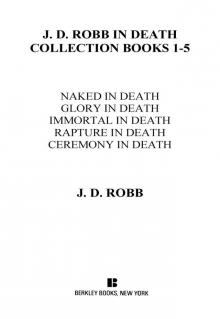 The In Death Collection, Books 1-5
The In Death Collection, Books 1-5